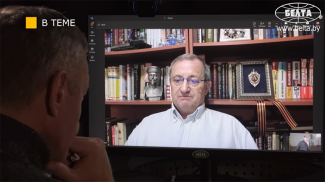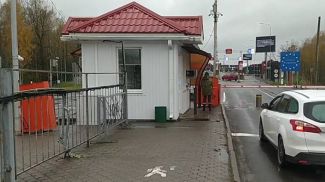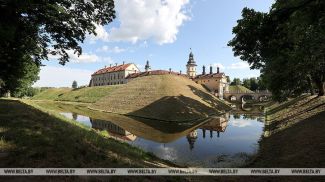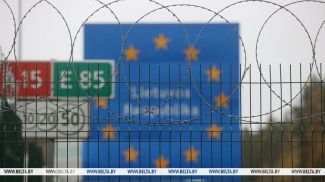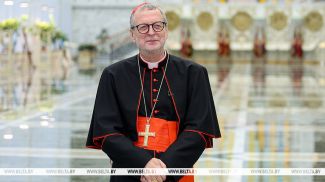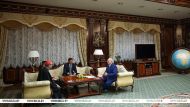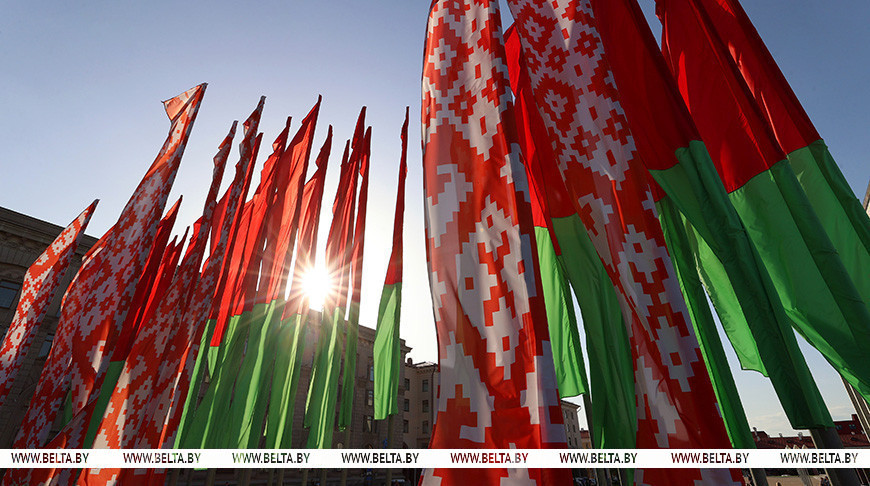
An archive photo
MINSK, 8 July (BelTA) – Thirty years ago, on 10 July 1994, Belarusians cast their ballots in a run-off presidential election. There were six candidates on the ballot. Aleksandr Lukashenko took a solid lead in the first round and won the run-off in a landslide with more than 80% of the votes. The country's thorny path to sovereignty and independence was chronicled by the ONT TV channel, BelTA has learned.
The standard of living was falling, the country was torn apart by internal splits - those were the first years of Belarusian independence. People hoped for a better future, but felt completely desperate in the moment. Lawlessness, anarchy and hopelessness were widespread. The Supreme Council was bogged down in endless debates and intrigues.
“If a country is in such a limbo, it needs a strong and solid government that has the authority to make decisions and ensure their immediate implementation. Finally the situation was stabilized and a development strategy was thrashed out,” said Chairman of the Bobruisk District Executive Committee (1995-1998) Anatoly Glaz.
At that time, the fledgling state did not even have its own independent Constitution. The Constitution was adopted only in March 1994. It was a pivotal moment. One of the key points of the new Constitution was the introduction of the post of the president. Belarus embarked on preparations for the most important election campaign in its history.
Neither a democrat, nor a communist, but a realist - this is what they said about candidate Lukashenko. His campaign rallies and speeches drew attention. His manner of speaking was sincere, candid and charismatic. The authorities looked askance at the candidate, but people believed him. And people made their choice. In the run-off in July 1994, Aleksandr Lukashenko received more than 80% of the votes.
“Common sense prevailed, which helped the Belarusian people draw strength and find the person who did not pursue vested interests, but tried to fulfill the aspirations of people and address problems facing the country. Belarus has held out due to a strong hand, strong government, the ability to concentrate power,” said Igor Buzovsky, Rector of the Academy of Public Administration under the aegis of the President of the Republic of Belarus.
When Lukashenko came to power, changes were not long in coming. Belarus embarked on a path of fast and irreversible transformation. Many processes had to be micro-managed as order had to be restored in all sectors - from economy to healthcare.
“There were 4-5 pairs of gloves a week. We had to spend our time looking for means of treatment rather than treating patients. We probably would not have been able to pull it off if not for consistent and tough action on the part of the government,” emphasized Garik Barsamyan, member of the Council of the Republic, chief physician of the Minsk Central District Hospital.
A strong leader who acted solely in the interests of his country and set out on a course of integration with Russia did not suit the West. Thus, the first sanctions against Belarus were introduced.
“We have always been open towards the European Union. Yet, they chose a different approach. It was not about human rights. Most likely, it was because we rejected the kind of relations that the European Union offered us. They don’t like strong leaders. They like those who follow in the footsteps of the European Union and the United States,” remarked Deputy Minister of Foreign Affairs of Belarus (1994-1997) Mikhail Khvostov. The main outcome of these 30 years is that the country remained united. And this helps preserve the greatest value the current generation has - sovereignty. Belarus prioritizes the interests of people, the country’s traditions and history.
The standard of living was falling, the country was torn apart by internal splits - those were the first years of Belarusian independence. People hoped for a better future, but felt completely desperate in the moment. Lawlessness, anarchy and hopelessness were widespread. The Supreme Council was bogged down in endless debates and intrigues.
“If a country is in such a limbo, it needs a strong and solid government that has the authority to make decisions and ensure their immediate implementation. Finally the situation was stabilized and a development strategy was thrashed out,” said Chairman of the Bobruisk District Executive Committee (1995-1998) Anatoly Glaz.
At that time, the fledgling state did not even have its own independent Constitution. The Constitution was adopted only in March 1994. It was a pivotal moment. One of the key points of the new Constitution was the introduction of the post of the president. Belarus embarked on preparations for the most important election campaign in its history.
Neither a democrat, nor a communist, but a realist - this is what they said about candidate Lukashenko. His campaign rallies and speeches drew attention. His manner of speaking was sincere, candid and charismatic. The authorities looked askance at the candidate, but people believed him. And people made their choice. In the run-off in July 1994, Aleksandr Lukashenko received more than 80% of the votes.
“Common sense prevailed, which helped the Belarusian people draw strength and find the person who did not pursue vested interests, but tried to fulfill the aspirations of people and address problems facing the country. Belarus has held out due to a strong hand, strong government, the ability to concentrate power,” said Igor Buzovsky, Rector of the Academy of Public Administration under the aegis of the President of the Republic of Belarus.
When Lukashenko came to power, changes were not long in coming. Belarus embarked on a path of fast and irreversible transformation. Many processes had to be micro-managed as order had to be restored in all sectors - from economy to healthcare.
“There were 4-5 pairs of gloves a week. We had to spend our time looking for means of treatment rather than treating patients. We probably would not have been able to pull it off if not for consistent and tough action on the part of the government,” emphasized Garik Barsamyan, member of the Council of the Republic, chief physician of the Minsk Central District Hospital.
A strong leader who acted solely in the interests of his country and set out on a course of integration with Russia did not suit the West. Thus, the first sanctions against Belarus were introduced.
“We have always been open towards the European Union. Yet, they chose a different approach. It was not about human rights. Most likely, it was because we rejected the kind of relations that the European Union offered us. They don’t like strong leaders. They like those who follow in the footsteps of the European Union and the United States,” remarked Deputy Minister of Foreign Affairs of Belarus (1994-1997) Mikhail Khvostov. The main outcome of these 30 years is that the country remained united. And this helps preserve the greatest value the current generation has - sovereignty. Belarus prioritizes the interests of people, the country’s traditions and history.




